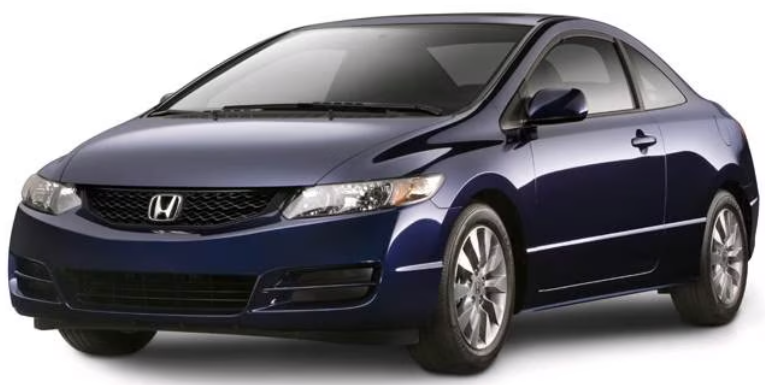
What is my neighbor paying for their 2011 HONDA CIVIC
Liability-Only Coverage, 2011 HONDA CIVIC
See a sample rate for a Female Driver/Single 28-year-old – Liability-Only
2011 HONDA CIVIC: SAMPLE QUOTE
| Coverages and other Factors |
|---|
| Coverage Type: Liability-Only |
| Number of Vehicles on Policy: 1 |
| Year/Make/Model: 2011 HONDA CIVIC |
| Ownership Status: Own |
| Roadside/Towing: No |
| Rental Coverage: No |
| More Auto Coverage Details |
|---|
| Insurance Company: Progressive Insurance Company |
| Liability Limits: $25,000 each person,$50,000 each accident,$25,000 each accident |
| Uninsured Motorist: $25,000 each person,$50,000 each accident,$25,000 each accident with $200 deductible |
| Underinsured Motorist: Rejected |
| Medical Payments: Rejected |
| Comprehensive/Collison Deductible: No Coverage |
Insurance Rating Factors
State:
South Carolina
Gender: Female
Age Group: 20’s
Legal Marital Status: Single
Prior Insurance: Yes
Violations: No
SR-22: Not Required
Discounts Applied:
Disclaimer: The purpose of this page is to showcase an estimate of what insurance may cost an individual with these products and/or circumstances. This is based on a real quote.
Who Is Progressive Insurance Company?
Progressive Insurance is an insurance company that provides a wide range of insurance products and services, with a primary focus on auto insurance. It is one of the largest auto insurance providers in the United States.
Here are some key points about Progressive Insurance:
- Overview: Progressive Insurance, officially known as The Progressive Corporation, was founded in 1937 by Joseph Lewis and Jack Green. The company is headquartered in Mayfield Village, Ohio.
- Auto Insurance: Progressive is widely recognized for its auto insurance offerings. The company provides coverage for various types of vehicles, including cars, motorcycles, boats, and recreational vehicles. They offer standard coverage options such as liability, comprehensive, and collision insurance.
- Snapshot Program: Progressive is known for its Snapshot program, which utilizes telematics technology to monitor customers’ driving habits. Customers can install a device or use the mobile app to track their driving behavior and potentially earn discounts based on safe driving habits.
- Other Insurance Products: In addition to auto insurance, Progressive offers a range of other insurance products, including homeowners insurance, renters insurance, condo insurance, and umbrella insurance. They also provide coverage for businesses and commercial vehicles.
- Online and Direct Sales: Progressive is known for its direct-to-consumer approach. They offer the convenience of online quoting, policy management, and claims filing through their website and mobile app. Customers can purchase insurance directly from Progressive without going through an agent.
- Claims Service: Progressive emphasizes its claims service, aiming to provide efficient and convenient claims handling for policyholders. They offer various options for reporting and managing claims, including online and mobile claims filing.
- Market Presence: Progressive has a significant market presence in the United States and serves customers in all 50 states. They have a network of independent insurance agents as well as their direct sales channel.
Progressive Insurance has built a reputation as an innovative and customer-centric insurance company, known for its auto insurance offerings and technological advancements in the industry. However, as with any insurance provider, it’s always advisable to review the specific terms, coverage options, and customer reviews before making a decision.
When should you opt out of Full Coverage
Full coverage insurance is typically recommended in situations where you want comprehensive protection for your vehicle. However, there may be some cases where getting full coverage may not be necessary or cost-effective. Here are a few scenarios where you might consider forgoing full coverage:
- Older vehicles: If you own an older vehicle with a low market value, the cost of full coverage insurance premiums may outweigh the potential benefits. In some cases, the annual premiums may be close to or even exceed the value of the vehicle itself. It might be more practical to opt for liability coverage or choose a higher deductible for comprehensive and collision coverage.
- Financial constraints: If you’re on a tight budget and struggling to afford full coverage insurance, you may need to prioritize your expenses. Liability insurance, which covers damage to other people’s property or injuries caused by you, is typically required by law, but comprehensive and collision coverage are optional. Assess your financial situation and make an informed decision based on your priorities.
- Low-risk environments: If you live in an area with minimal traffic congestion, low crime rates, and a low risk of accidents or theft, you might consider reducing your coverage. Assess the likelihood of specific risks and weigh them against the cost of insurance. However, keep in mind that unexpected incidents can still occur even in low-risk areas.
- Alternative means of transportation: If you have access to alternative transportation options, such as public transit or car-sharing services, and you rarely use your vehicle, you might consider reducing your coverage. If your car spends most of its time parked and you only use it occasionally, adjusting your insurance to reflect this reduced usage might help save costs.
- Personal preference and risk tolerance: Ultimately, the decision to get full coverage or not depends on your personal circumstances and risk tolerance. Some individuals may prefer the peace of mind that comes with comprehensive coverage, while others may be comfortable assuming more risk and opting for a less comprehensive policy.
Remember, these are general considerations, and it’s important to consult with an insurance professional or agent who can provide personalized advice based on your specific situation and local regulations.
What is the reputation of a 2011 HONDA CIVIC
The 2011 Honda Civic has generally maintained a positive reputation over the years. Here are some key points about its reputation:
- Reliability: Honda Civics, including the 2011 model, are known for their reliability. They are often praised for their longevity and dependability. The Civic’s reputation for reliability has contributed to its popularity among car owners.
- Fuel Efficiency: The 2011 Honda Civic is known for its fuel efficiency, which is a desirable feature for many drivers. It offers good gas mileage, especially in its smaller engine options, making it an economical choice for daily commuting and long trips.
- Safety: The 2011 Honda Civic has performed well in safety tests. It received good ratings in various crash tests conducted by organizations like the Insurance Institute for Highway Safety (IIHS) and the National Highway Traffic Safety Administration (NHTSA). It also comes equipped with standard safety features, such as anti-lock brakes and multiple airbags.
- Resale Value: Hondas, including the Civic, typically hold their value well over time. The 2011 Honda Civic’s reputation for reliability, fuel efficiency, and overall popularity contributes to its strong resale value compared to some other vehicles in its class.
- Customer Satisfaction: The 2011 Honda Civic has garnered positive reviews from many owners. It is often praised for its comfortable and practical interior, smooth ride, and low maintenance costs. However, some owners have expressed concerns about road noise and the quality of certain interior materials.
- Performance: The performance of the 2011 Honda Civic varies depending on the specific trim level and engine option. While it may not be the most powerful or sporty vehicle in its class, it generally provides adequate performance for everyday driving needs.
It’s important to keep in mind that individual experiences can vary, and factors such as maintenance history, mileage, and overall condition of the specific vehicle can influence its reputation. If you’re considering purchasing a used 2011 Honda Civic, it’s advisable to have a trusted mechanic perform a thorough inspection to assess its condition and ensure that it meets your expectations. Additionally, reading owner reviews, consulting automotive publications, and researching any known issues or recalls can provide you with more insights into the vehicle’s reputation.
6-Month Premium:
Monthly Installments:
Curious to see what YOUR quote would be? Click here to fill out an online form to receive a estimate or give us a call at 888-445-2793. 
Need Some Proof? Check Out Some of Our Reviews!
INSURANCE SERVICES WE OFFER

Homeowners Insurance
Homeowners, renters, and mobile home owners: make sure you have the protection you need.




